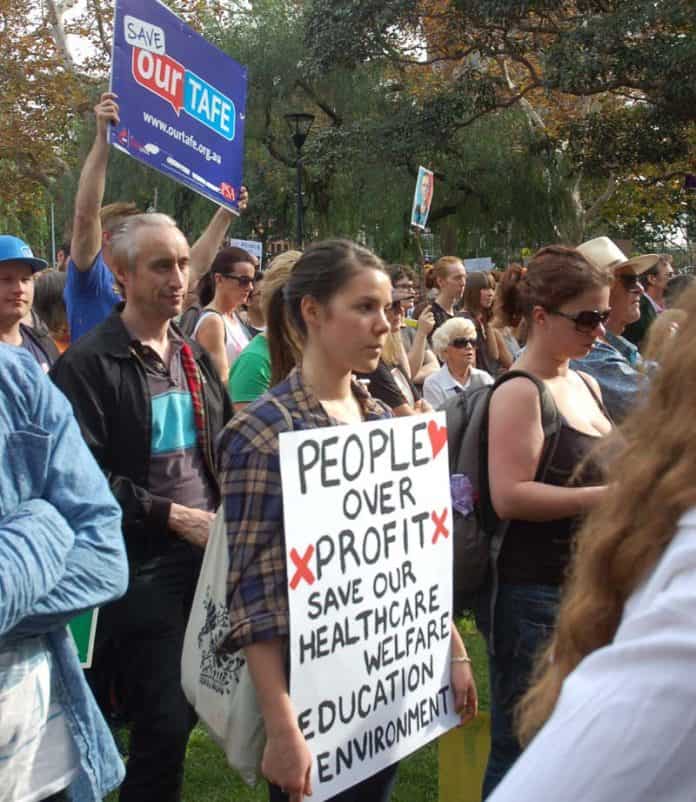With the budget, the Liberals’ agenda is now dramatically on show.
The claims of a budget crisis are a myth. Treasurer Joe Hockey is in no urgent rush to slash the deficit, with cutbacks contributing just $1 billion in savings over the next year. What he wants to do is entrench fundamental, neo-liberal changes to the health system, universities and welfare over the long term.
The budget lays out plans for years of escalating fees and cutbacks to welfare, education and health. It represents a massive ideological attack on the welfare state and a redistribution of wealth from workers and the poor to the rich and big business. Abbott and Hockey want to stamp out any idea that workers are entitled to unemployment benefits or pensions and entrench a “user-pays” approach to government services. The increase in the petrol excise will take billions from working class pockets.
At the same time Hockey has pledged to cut corporate tax by 1.5 per cent, at an estimated cost of $4 billion a year.
Despite the talk of everyone “sharing the load”, those that can least afford it, the unemployed, the sick and the elderly, will bear the brunt of the cuts.
The learn or earn attack on welfare is ruthless, with young people under 30 to be denied any Centrelink payments for their first six months of unemployment. Then, after six months of working for the dole, payments will be completely cut again if they have failed to find a job.
Cuts to family tax benefits mean a single income couple with two children on $65,000 will lose an incredible $122 a week, according to the National Centre for Social and Economic Modelling.
ANU public policy experts Peter Whiteford and Daniel Nethery calculate that an unemployed single parent with an eight year-old child will lose $47 a week or 12 per cent of their income.
The Liberals want to destroy Medicare. Increasing charges for prescription medicines and imposing a $7 fee on visits to the GP are designed to undermine Medicare as a universal healthcare system. They want Medicare reduced to a safety net that caters only for the very poor, with everyone else paying for private healthcare.
Similarly, with Abbott’s changes to universities, high quality tertiary education will once again become a privilege for the rich. Student fees will rise, with degrees costing $150,000 likely as universities set fees at whatever level they wish from 2016. Student debt will increase at the same time as the government charges higher interest on HECS debts.
Abbott and Hockey’s deficit tax, the one measure that targets the rich, is token. People earning over $180,000 can easily afford to pay. The deficit tax will raise around $1 billion a year. The last round of major income tax cuts saved the top 10 per cent of income earners $15.8 billion a year.
The deficit tax will be temporary, but the attack on workers and damage to welfare, education and health will be permanent.
Ideological agenda
To understand the ideological agenda behind Abbott’s budget, we need look no further than the Commission of Audit. The Commission was practically outsourced to the Business Council of Australia, which represents the CEOs of Australia’s 100 biggest companies.
The report was a corporate wish-list and part of a scare campaign about the deficit and rapidly rising costs in health and welfare spending. But the real issue is not growing costs, but the government’s refusal to increase tax on corporations and the rich to pay for them.
In classic neo-liberal style, the Commission insisted that tax and government spending must be kept low. It advised the government to keep tax as a share of the economy, or GDP, to 24 per cent. This level is simply “pragmatic”, it claims, based on the average level of tax in the last decade.
But Australia is a low taxing nation by international standards. Including all levels of government Australia’s tax take is 26.5 per cent of GDP—compared with the OECD average of 34.1 per cent. Australia’s is the third lowest rate among the 34 OECD nations.
The reason is obvious. Big business wants a continuation of the cuts to corporate tax and income tax on high income earners entrenched by successive governments. They are out to maintain and increase profits.
Since the 1980s the tax on corporate profits has been slashed from 46 to 30 per cent. And Abbott has moved to cut it further, down to 28.5 per cent. Those at the top rate of income tax paid 60 per cent in 1985. Even with Abbott’s temporary deficit tax this will reach just 47 per cent.
Despite this, the Commission declared that, when it comes to services and government spending, “the community’s expectations have run ahead of what can be afforded”. This amounts to insisting that democracy must go out the window due to the wishes of business.
And the push to force the tax burden further onto workers has already begun. There is a growing chorus of ruling class and media commentators demanding an increase in the GST. This includes Treasury Secretary Martin Parkinson and economists like Fairfax’s Peter Martin who believes, “Australia’s GST is embarrassingly low by international standards.”
Abbott and Hockey’s savage cuts to hospitals and schools funding to the states, of $80 billion in the next decade, will produce a renewed push by the states for a higher GST.
Abbott’s big business vision for Australia means running down public services like health and education, pushing more people into paying for services like private health and punishing the poor. It is the logic of a system that puts profits before the needs of ordinary people.
But the wealth that exists is more than enough to provide decent services and living standards for everyone. Abbott has to go. It’s time to demand we tax the rich.
By James Supple






